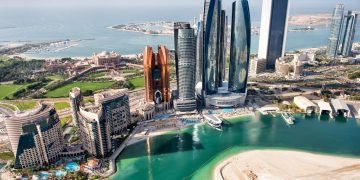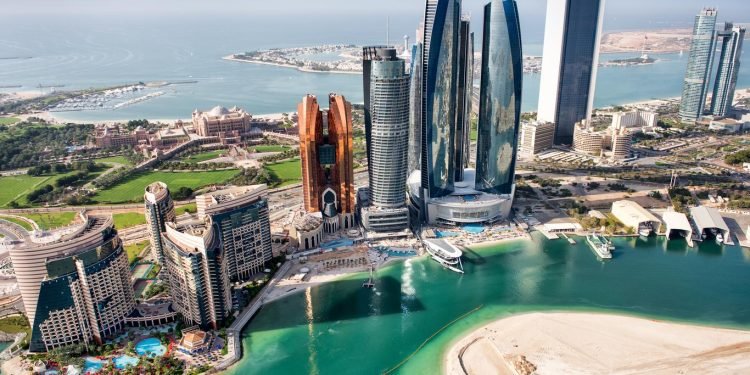Abu Dhabi, the capital of the United Arab Emirates (UAE), is rapidly establishing itself as a global center for business and innovation. Its strategic location, business-friendly environment, and forward-looking leadership have transformed it into a hotspot for investment across various industries. From logistics and technology to renewable energy and tourism, Abu Dhabi offers a wealth of opportunities for companies looking to expand their reach in the Middle East and beyond.
1. Strategic Location and Connectivity
Located at the crossroads of Asia, Europe, and Africa, Abu Dhabi provides businesses with easy access to some of the world’s largest and fastest-growing markets. Its modern infrastructure, including state-of-the-art airports and seaports, has made it a key hub for global trade. Abu Dhabi Ports, for instance, is home to Khalifa Port, one of the most advanced deep-water ports in the region, playing a pivotal role in international shipping and logistics.
The city is also well-connected by air, with Abu Dhabi International Airport serving as a central hub for cargo and passenger flights. This seamless connectivity makes it an ideal base for logistics, shipping, and supply chain operations looking to scale across the Middle East, Asia, and Africa.
2. Logistics and Trade Hub
Abu Dhabi’s role as a logistics and trade hub continues to grow, driven by significant investments in infrastructure. The Khalifa Industrial Zone Abu Dhabi (KIZAD), part of Abu Dhabi Ports, offers companies world-class logistics and industrial facilities. With its prime location, KIZAD connects businesses to more than 4.5 billion consumers within just eight flight hours, making it an attractive destination for manufacturing, trade, and distribution activities.
The city’s focus on logistics makes it a key player for freight forwarders, shipping companies, and supply chain management firms looking to establish a regional foothold.
3. Investment in Renewable Energy
Abu Dhabi has become a global leader in renewable energy, a sector that is poised for growth as the world shifts toward cleaner, sustainable power sources. The city is home to Masdar City, one of the world’s first eco-cities, designed to be powered entirely by renewable energy. Masdar, Abu Dhabi’s renewable energy company, is at the forefront of developing sustainable energy projects worldwide.
For companies operating in renewable energy, clean technologies, and sustainability-focused innovations, Abu Dhabi presents an exciting opportunity to collaborate with industry leaders and tap into government-backed projects aimed at reducing carbon emissions and promoting green technologies.
4. Technology and Innovation
Abu Dhabi’s leadership has prioritized building a knowledge-based economy, making technology and innovation key pillars of its growth strategy. The government has launched initiatives such as the Abu Dhabi Investment Office (ADIO), which supports businesses in tech sectors, offering incentives for innovation, research, and development. The city’s growing tech ecosystem, combined with a strong focus on digital transformation, has attracted global companies in sectors such as artificial intelligence (AI), fintech, and cybersecurity.
For tech entrepreneurs and startups, Abu Dhabi provides access to funding, incubators, and a supportive regulatory environment, creating fertile ground for new ventures to thrive.
5. Financial and Legal Support
Abu Dhabi Global Market (ADGM), the city’s international financial center, is a key player in offering businesses a secure and regulated environment to grow. ADGM’s legal framework is based on English common law, making it familiar to international investors. The financial center supports a range of industries including banking, fintech, insurance, and asset management.
With attractive tax incentives, no corporate or income tax, and full repatriation of profits, Abu Dhabi provides a business-friendly regulatory environment that encourages foreign direct investment. ADGM has also implemented regulations for fintech and digital assets, positioning itself as a hub for financial innovation.
6. Tourism and Real Estate
Abu Dhabi’s tourism sector is expanding rapidly, with government initiatives aimed at boosting visitor numbers. The city’s rich cultural heritage, coupled with modern attractions like Yas Island, the Louvre Abu Dhabi, and Ferrari World, makes it an appealing destination for both leisure and business travelers. Abu Dhabi’s thriving tourism sector offers opportunities in hospitality, entertainment, and real estate development.
In addition, the city’s real estate market is growing, driven by strong demand for residential, commercial, and industrial properties. Investors can capitalize on Abu Dhabi’s expanding population and its growing status as a business destination.
7. Government Initiatives and Vision 2030
Abu Dhabi’s long-term strategy, outlined in its Vision 2030 plan, focuses on diversifying the economy away from oil dependency by promoting sectors like tourism, technology, logistics, and renewable energy. The government’s commitment to innovation and economic diversification has led to significant infrastructure projects and public-private partnerships, creating an ideal landscape for foreign and local businesses alike to flourish.
The Emirate offers a range of free zones, each tailored to specific industries, such as logistics, finance, and media. These zones provide numerous benefits, including 100% foreign ownership, zero taxes, and streamlined licensing processes.
Conclusion
Abu Dhabi’s strategic positioning, diverse business opportunities, and government-backed initiatives make it a premier destination for companies looking to expand into the Middle East. From logistics and technology to renewable energy and real estate, the city offers an array of opportunities for businesses seeking growth and innovation in a dynamic and forward-thinking market. Whether you’re a startup or an established enterprise, Abu Dhabi provides the infrastructure, legal framework, and financial incentives to help your business thrive in the global marketplace.























